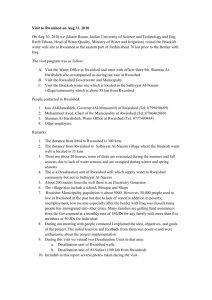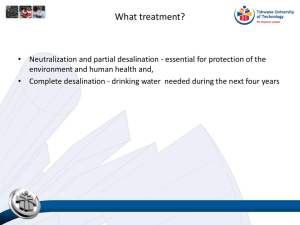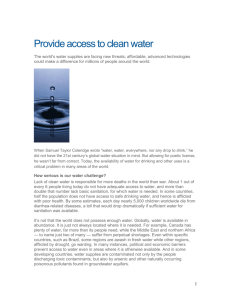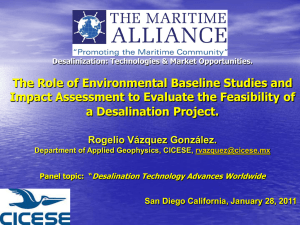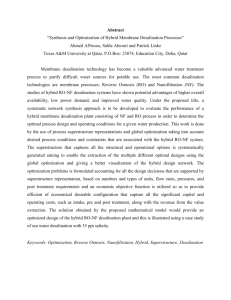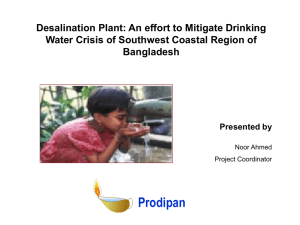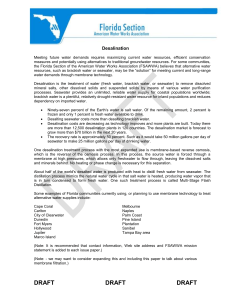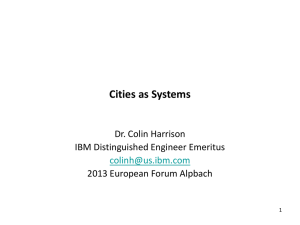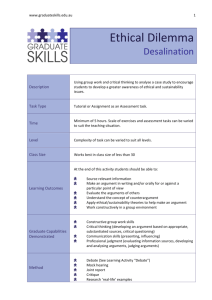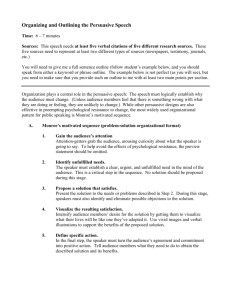Mr Tim Williams, Senior Advisor,
advertisement
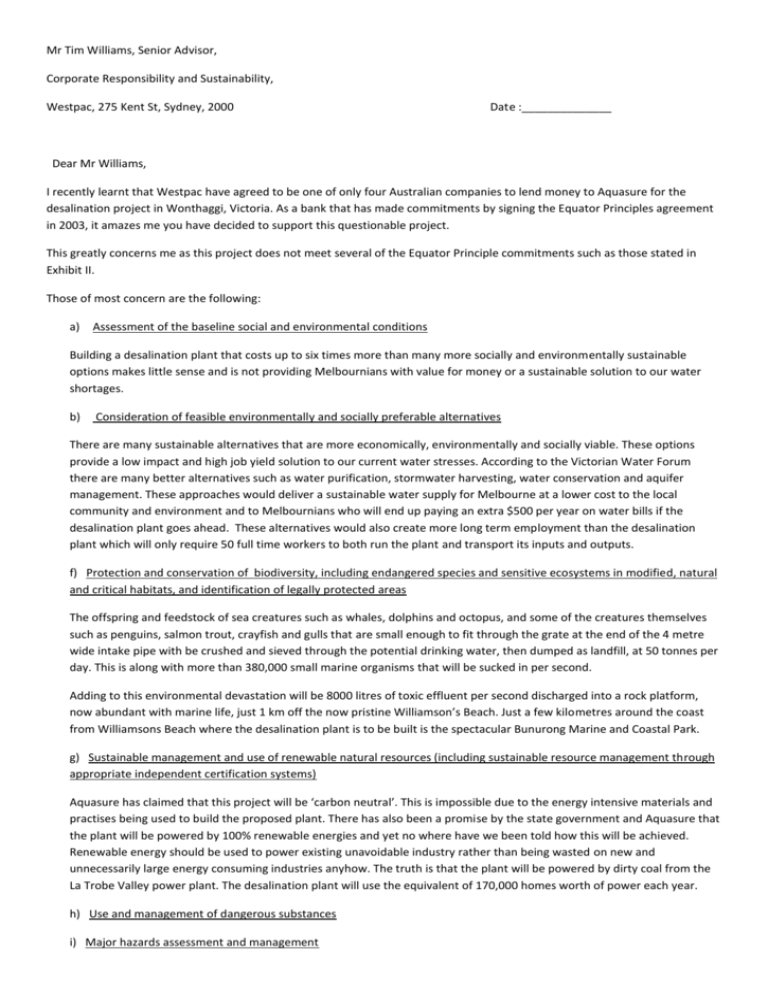
Mr Tim Williams, Senior Advisor, Corporate Responsibility and Sustainability, Westpac, 275 Kent St, Sydney, 2000 Date :______________ Dear Mr Williams, I recently learnt that Westpac have agreed to be one of only four Australian companies to lend money to Aquasure for the desalination project in Wonthaggi, Victoria. As a bank that has made commitments by signing the Equator Principles agreement in 2003, it amazes me you have decided to support this questionable project. This greatly concerns me as this project does not meet several of the Equator Principle commitments such as those stated in Exhibit II. Those of most concern are the following: a) Assessment of the baseline social and environmental conditions Building a desalination plant that costs up to six times more than many more socially and environmentally sustainable options makes little sense and is not providing Melbournians with value for money or a sustainable solution to our water shortages. b) Consideration of feasible environmentally and socially preferable alternatives There are many sustainable alternatives that are more economically, environmentally and socially viable. These options provide a low impact and high job yield solution to our current water stresses. According to the Victorian Water Forum there are many better alternatives such as water purification, stormwater harvesting, water conservation and aquifer management. These approaches would deliver a sustainable water supply for Melbourne at a lower cost to the local community and environment and to Melbournians who will end up paying an extra $500 per year on water bills if the desalination plant goes ahead. These alternatives would also create more long term employment than the desalination plant which will only require 50 full time workers to both run the plant and transport its inputs and outputs. f) Protection and conservation of biodiversity, including endangered species and sensitive ecosystems in modified, natural and critical habitats, and identification of legally protected areas The offspring and feedstock of sea creatures such as whales, dolphins and octopus, and some of the creatures themselves such as penguins, salmon trout, crayfish and gulls that are small enough to fit through the grate at the end of the 4 metre wide intake pipe with be crushed and sieved through the potential drinking water, then dumped as landfill, at 50 tonnes per day. This is along with more than 380,000 small marine organisms that will be sucked in per second. Adding to this environmental devastation will be 8000 litres of toxic effluent per second discharged into a rock platform, now abundant with marine life, just 1 km off the now pristine Williamson’s Beach. Just a few kilometres around the coast from Williamsons Beach where the desalination plant is to be built is the spectacular Bunurong Marine and Coastal Park. g) Sustainable management and use of renewable natural resources (including sustainable resource management through appropriate independent certification systems) Aquasure has claimed that this project will be ‘carbon neutral’. This is impossible due to the energy intensive materials and practises being used to build the proposed plant. There has also been a promise by the state government and Aquasure that the plant will be powered by 100% renewable energies and yet no where have we been told how this will be achieved. Renewable energy should be used to power existing unavoidable industry rather than being wasted on new and unnecessarily large energy consuming industries anyhow. The truth is that the plant will be powered by dirty coal from the La Trobe Valley power plant. The desalination plant will use the equivalent of 170,000 homes worth of power each year. h) Use and management of dangerous substances i) Major hazards assessment and management There will be 750 million litres of concentrated brine and toxins released into the Bass Strait everyday and annually the desalination plant will produce 2500 truckloads of waste and toxins that will go into landfill. m) Land acquisition and in-voluntary resettlement In order to put in the pipeline to Melbourne, many individual homes and properties will endure up to 2 years of disruption. And as of yet compensation amounts have not been discussed or confirmed by the State Government. Much of this disruption will not only affect people’s livelihoods but also the quality of soil due to the massive trenches to be dug. n) Impacts on affected communities, and disadvantaged or vulnerable groups There is a massive threat to the Bass Coast’s thriving tourist industry through the devastation the desalination plant will have on local marine wildlife, fish populations and the effects of power and pipe easements that will be built across Gippsland’s agricultural landscapes. q) Consultation and participation of affected parties in the design, review and implementation of the project There was no consultation with the local community prior to the announcement of the plan to build a desalination plant. Even worse, just before the 2006 state elections the leader of the labour party at the time, Mr Bracks said, “Recycling and conservation will secure Melbourne’s water supply. The energy generation (of a desalination plant) is enormous, the intrusion on the community is enormous and, of course, it’s extraordinarily expensive, really, what a hoax it is. We’re into long term solutions.” Many experts, local community groups & individuals have urged the government to consider other options but to no avail. To this day, Mr Brumby has refused to meet with the local Wonthaggi group, Watershed Victoria, to discuss their concerns. r) Efficient production, delivery and use of energy As discussed under principle g). Apart from using dirty coal to power this plant, there is the consideration of the need to be lowering our carbon emissions to tackle the ever growing threat of runaway climate change instead of investing in highly carbon intensive projects such as the desalination plant. s) Pollution prevention and waste minimisation, pollution controls (liquid effluents and air emissions) and solid and chemical waste There have been no considerations or plans put in place to prevent the immense increase of carbon pollution every year, which is equivalent to putting an extra 372,000 cars on the road 24/7. The desalination plant does not meet any of the above; there are many community and environmental impact concerns with this project, none of which have been addressed either by the Victorian Government or Aquasure. I would like to know if Westpac has fully understood the many environmental, waste, social and energy concerns of this project and why you have approved this loan? Yours sincerely, ________________________________________ Addresss_________________________________ ________________________________________ ________________________________________
